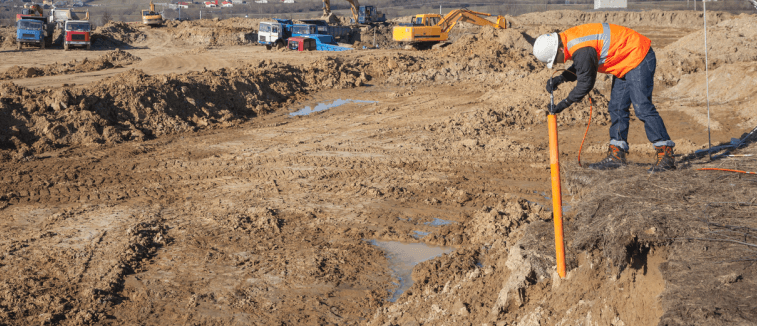Little Known Facts About Geotheta.
Little Known Facts About Geotheta.
Blog Article
Our Geotheta Ideas
Table of ContentsGeotheta Can Be Fun For AnyoneGeotheta - The FactsNot known Incorrect Statements About Geotheta Geotheta for BeginnersThe 6-Second Trick For Geotheta

They conduct site investigations, gather samples, execute laboratory tests, and examine information to assess the viability of the ground for building and construction projects - Engineer of Record. Based on their findings, geotechnical engineers give suggestions for foundation style, incline security, retaining structures, and mitigation of geotechnical dangers. They work together with various other specialists, such as engineers, architectural engineers, and building and construction groups, to make certain that geotechnical factors to consider are incorporated into the overall task design and application
By examining the habits and properties of dirt and rock, they can identify potential geotechnical hazards such as landslides, soil settlement, or incline instability. Their competence assists avoid failings or crashes that can threaten lives and property. Below are some in-depth tasks and obligations of a geotechnical engineer: Website Examination: Geotechnical designers conduct site investigations to collect data on subsurface problems.
They translate the data to recognize the residential properties and actions of the dirt and rock, including their strength, permeability, compaction qualities, and groundwater problems. Geotechnical Analysis and Style: Geotechnical engineers evaluate the information gathered during site investigations to examine the security and suitability of the site for building jobs. They do geotechnical computations and modeling to review aspects such as bearing capability, settlement, slope stability, side planet stress, and groundwater circulation.
Getting The Geotheta To Work
Foundation Design: Geotechnical designers play an essential function in developing foundations that can securely sustain the desired structure. They assess the dirt problems and load requirements to determine the ideal structure type, such as superficial structures (e.g., footings), deep structures (e.g (https://www.find-us-here.com/businesses/Geotheta-Alexandria-Alabama-USA/34113488/)., stacks), or specialized techniques like dirt improvement. They think about variables such as negotiation limitations, bearing capacity, and soil-structure interaction to develop optimal structure styles
They review construction strategies, display site activities, and perform field inspections to verify that the layout referrals are complied with. If unforeseen geotechnical concerns occur, they assess the scenario and supply suggestions for remediation or adjustments to the design. Risk Assessment and Reduction: Geotechnical designers assess geotechnical threats and dangers connected with the job site, such as landslides, liquefaction, or dirt erosion.

Collaboration and Interaction: Geotechnical designers function carefully with various other specialists associated with a project, such as architects, structural engineers, and building and construction groups. Efficient communication and cooperation are necessary to incorporate geotechnical considerations right into the overall task style and construction process. Geotechnical engineers supply technological know-how, answer inquiries, and guarantee that geotechnical needs are met.
Some Of Geotheta
Here are some kinds of geotechnical designers: Foundation Engineer: Structure designers focus on making and assessing foundations for frameworks. They assess the soil problems, tons demands, and site qualities to determine one of the most appropriate structure kind and design, such as shallow foundations, deep structures, or specialized techniques like heap structures.
They assess the aspects affecting incline stability, such as soil residential properties, groundwater conditions, and slope geometry, and establish methods to stop slope failings and mitigate dangers. Earthquake Engineer: Earthquake engineers focus on assessing and making structures to stand up to seismic forces. They assess the seismic danger of a site, evaluate soil liquefaction capacity, and develop seismic style requirements to guarantee the safety and security and durability of structures throughout earthquakes.
They carry out area screening, gather examples, and analyze the accumulated data to identify the soil properties, geologic formations, and groundwater problems at a site. Geotechnical Instrumentation Designer: Geotechnical instrumentation designers concentrate on surveillance and determining the habits of dirt, rock, and structures. They mount and preserve instrumentation systems that keep an eye on factors such as soil settlement, groundwater levels, incline motions, and architectural variations to evaluate performance and provide very early cautions of potential issues.
The Ultimate Guide To Geotheta
They perform tests such as triaxial examinations, combination Extra resources tests, straight shear tests, and permeability examinations to collect information for geotechnical evaluation and layout. Geosynthetics Designer: Geosynthetics designers focus on the layout and application of geosynthetic materials, such as geotextiles, geogrids, and geomembranes. They make use of these products to improve dirt security, reinforce inclines, supply water drainage options, and control erosion.
They have a tendency to be investigative individuals, which indicates they're intellectual, reflective, and curious. They are interested, systematic, reasonable, analytical, and logical. Some of them are also social, meaning they're kind, charitable, cooperative, client, caring, handy, empathetic, sensible, and friendly - Tailings Engineer.
In the workplace atmosphere, geotechnical engineers use specialized software application devices to execute estimations, produce layouts, and assess information. They prepare records, review project requirements, connect with customers and group members, and coordinate project tasks. The workplace setup supplies a favorable atmosphere for research, evaluation, and cooperation with various other professionals entailed in the job.
Some Ideas on Geotheta You Need To Know
They regularly go to task websites to perform site examinations, examine geotechnical conditions, and collect information for analysis. These gos to include taking a trip to different locations, in some cases in remote or tough terrains. Geotechnical engineers might perform soil sampling, conduct examinations, and screen construction tasks to guarantee that the geotechnical facets of the project are being applied appropriately.
Geotechnical engineers additionally work in specialized geotechnical research laboratories. In these facilities, they conduct experiments, do examinations on soil and rock samples, and assess the design residential properties of the products. Geotechnical laboratory engineers work thoroughly in these environments, managing testing devices, running instruments, and tape-recording data. They collaborate with other lab personnel to make sure exact and trusted screening outcomes.
Report this page